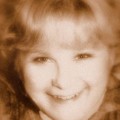Kit Prate grew up during the era of western films and prime time TV westerns; when the line between outlaw and hero was clearly defined and good always triumphed over evil. Her playgrounds were the vacant fields of a small town in Illinois that also was home to an active stockyard, where she was given free run of the pastures and the barns. She saw first hand the day-to-day work of the cowboys who rode the stock trains from Kansas City and beyond to tend both cattle and sheep. It was there, at the age of five, she learned to ride; as well as how to rope and – at the tender age of ten – how to build a hand-rolled cigarette.
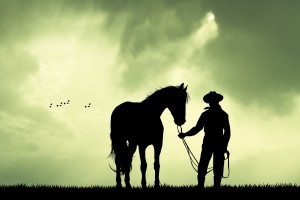
What was your hardest scene to write?
Killing off a character in Hot Night in Purgatory – a teen-aged boy – who I had originally thought was going to be a keeper. Never thought for a moment Bret was going to die, but the scene just seemed to write itself. I mourned that death for three days, but couldn’t justify changing it because it was necessary. His death is the catalyst for everything that happens afterwards.
What are common traps for aspiring writers?
Allowing other people to pull you away from using your own voice. The other biggest trap is assuming you have to “measure up” to established authors by mimicking their style. I always get tickled when someone mentions one of my books and follows with “writing in the style of Louis L’Amour”. It’s really funny to me, because the ONLY Louis L’Amour I ever read was when he was writing as Tex Burns for the Hopalong Cassidy franchise. Since I had grown up on the “original”, Clarence Mulford, I absolutely hated the Tex Burns take on the character.
What is the most unethical practice in the publishing industry?
Let me count the ways. My biggest gripe with the publishers in New York was the issue of royalties; and the practice of cutting deals with publishers abroad, and never seeing any income from those sales. The other gripe: finding out some of my books had gone “audio”, and never seeing any income from those sales, in spite of what the original contracts stated. Having to depend on your publisher for accurate sales figures was very much akin to allowing the fox to guard the hen house.
 Does writing energize or exhaust you?
Does writing energize or exhaust you?
Depends on my mood at the time; and what I’m working on. It definitely gets harder as you age; and real life has a way of influencing what you do. And when.
Does a big ego help or hurt writers?
Ego can get in the way; and it can be self-destructive. Especially if you allow it to get in the way of taking good advice from a peer.
If you could tell your younger writing self anything, what would it be?
Stay single. It would also help if you were born an only child. And train for a career to fall back on.
How did publishing your first book change your process of writing?
Not much. For me, it has to come from “the gut”. It did teach me to be selective about who I was dealing with; and the editors that crossed my path.
What was the best money you ever spent as a writer?
Without a d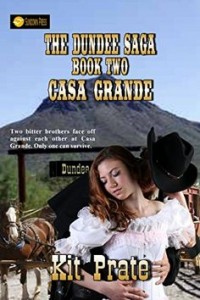 oubt, my first computer.
oubt, my first computer.
What authors did you dislike at first but grew into?
Never grew into L’Amour. The first book I read by Giles Lutz almost turned me off, but I grew to love everything he wrote.
What did you do with your first advance?
Took my Mother out for a really nice lunch. She was my biggest supporter.
How many hours a day do you write?
Not as many as I should at this point. Too much real life going on.
What period of your life do you find you write about most often? (child, teenager, young adult)
Almos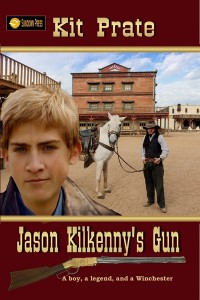 t all of what I write is about mentor/father/son angst. I saw a lot of that growing up, and that drives the majority of my fiction.
t all of what I write is about mentor/father/son angst. I saw a lot of that growing up, and that drives the majority of my fiction.
What is the most difficult part of your artistic process?
Setting aside the time to just write. These “golden years” aren’t all they are cracked up to be.
What have you put most of your effort into regarding writing?
Trying to finish a trilogy I started when I was a teenager. It keeps growing and growing, but doesn’t seem to get finished.
What book that you have read has most influenced your life?
Actually, the Bible. Not to be tongue in cheek, but it reaffirms what I’ve always felt. There is no such thing as “original” fiction. Consciously or sub-consciously, a lot of what is written in the Old Testament can be a pattern for all kinds of fiction, because “it” is all there. Lust, betrayal, murder, sibling rivalry, the justification for war and cruelty. The tragedy of how when someone feels ordained by God for greatness they ultimately fail. I also feel that it is a great but often ignored guideline for how to live. Think about it. The world would be a much better place if we followed the Ten Commandments and paid more attention to all those words in red.
What 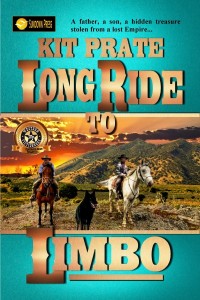 is your favorite genre? Why?
is your favorite genre? Why?
Without a doubt, westerns. Something uniquely “American”. But I’d like to dabble in horror someday.
Could you tell us a bit about LONG RIDE TO LIMBO and why it is a must-read?
Because I wrote it? Seriously, I was just trying to tell a story about a flawed hero who has some serious regrets about decisions he made that had unexpected consequences. Reese Sullivan needs to redeem himself in the eyes of his estranged son, and it is an uphill climb. And Trey isn’t exactly receptive to anything his father had to offer. So the question is, will Reese be able to not only redeem himself in his son’s eyes; but will he also be able to put Trey on the right path and turn him from a potential thief into someone who will finally do the right thing.

